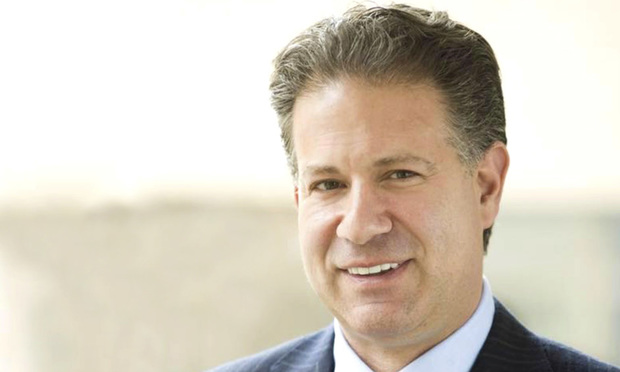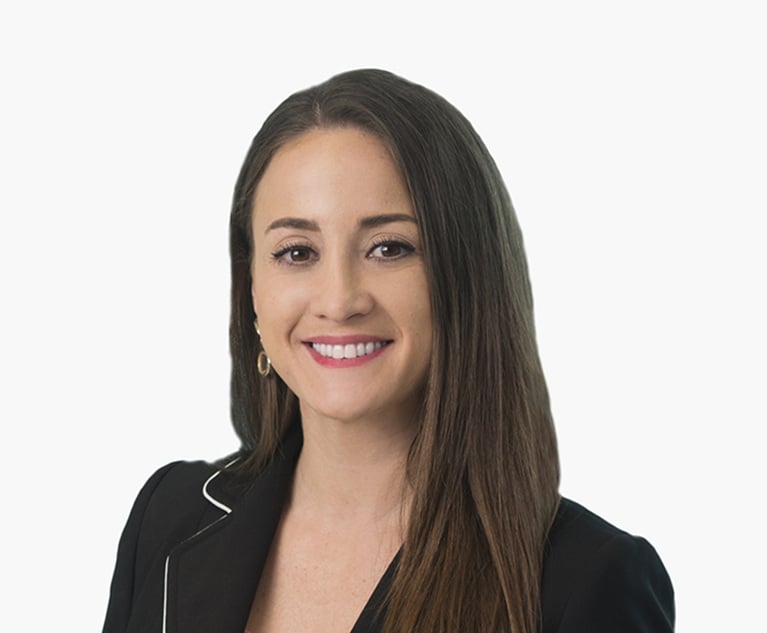Plaintiffs Move to Consolidate Litigation Against Bank of America, Chase Bank Over Agents' PPP Loan Fees
The lawsuit was brought against several major banks, including Bank of America and Chase Bank, along with regional bank Mountain America Federal Credit Union.
May 26, 2020 at 01:31 PM
4 minute read
 Michael S. Popok, managing partner at the New York office of Zumpano Patricios.
Michael S. Popok, managing partner at the New York office of Zumpano Patricios.
A group of litigants in Utah, California and New York are gearing to consolidate 11 cases across eight federal districts.
Their attorneys are seeking to move the litigation to the U.S. District Court for the Northern District of Georgia before Judge Leigh M. May, who presides over a related case. The alternative choice is U.S. District Judge Diane J. Humetewa in Arizona.
But defendants facing the nationwide class-action lawsuit said they are victims of a recent slew of filings accusing financial institutions of not paying agents for preparing and directing applications under the Paycheck Protection Program.
The lawsuit was initially brought by Panda Group as the lead plaintiff and proposed class representative, with five attorneys in three law firms. It names as defendants several major banks, including Bank of America Corp., Bank of America N.A., and Chase Bank USA, along with regional bank Mountain America Federal Credit Union.
The suit is focused on the three stakeholders involved in the Paycheck Protection Program under the CARES Act, which was passed by Congress in response to the economic fallout after mandatory stay-at-home orders amid the coronavirus pandemic.
The three stakeholders under the Paycheck Protection Program are the borrowers, the lenders and the agents. An attorney in the case for Panda, Michael S. Popok, a managing partner at Zumpano Patricios in New York, said the Treasury Department of the U.S. government determined that agents would play a critical role in making sure businesses in underserved and rural markets would receive money from the program.
"The federal government saw that mid-sized and small businesses probably have relationships with their accountant, with their CPA, with their payroll company, with their business consultants, more than they probably have a first-name relationship with their bank," Popok said.
But Popok said these major banks instead focused on their current clients, as well as businesses that would provide a more substantial fee income from funding Paycheck Protection Program loans. He claimed the large financial institutions are also refusing to pay referral agents, despite not having the legal authority to do so.
Read the memorandum:
The Small Business Administration states that the overall average Paycheck Protection Program loan amount is $118,000. The highest percentage of loans are in the range of $350,000 to $1 million. The banks earn a varying percentage of fees based upon the size of the loan, which should trickle down to the agents.
Under the CARES Act, the Small Business Administration pays lenders fees on Paycheck Protection Program loans at 5% for loans of $350,000 or less; 3% for loans between $350,000 to less than $2 million; and 1% for loans exceeding $2,000,000. The class action complaint asserts that, from these amounts, agents should receive fees of 1% for loans of $350,000 or less; 0.50% for loans exceeding $350,000 but less than $2 million; and 0.25% for loans beyond $2 million. The CARES Act merely states that an agent who assist in preparation of an application cannot receive a fee in excess of the fee limits established by the Small Business Administration. It is not clear from the statute what those "fee limits" for agents are.
For instance, Popok said one of the defendants told Panda Group that the bank loves when that accounting firm brings its loan package because it is "so perfect." But the bank will not pay a fee to the agent because "we just don't pay agents."
Without a private right of action against the Small Business Administration under the Small Business Act, it is unclear whether the bank is a secondary beneficiary entitled to that same protection. However, a defendant bank may still be on the hook to share its fee if it had a separate agreement with an agent who prepared the application and directed it to that bank.
An attorney for Chase Bank did not respond to a request for comment.
Mountain America Federal Credit Union said, "We are confident we will prevail and that the issue will be resolved quickly."
William Halldin, a spokesman for Bank of America, said the company's corporate counsel declined to comment.
He said, "This is one of several nearly identical cases brought since late April — all seeking the right to try to create a class."
This content has been archived. It is available through our partners, LexisNexis® and Bloomberg Law.
To view this content, please continue to their sites.
Not a Lexis Subscriber?
Subscribe Now
Not a Bloomberg Law Subscriber?
Subscribe Now
NOT FOR REPRINT
© 2025 ALM Global, LLC, All Rights Reserved. Request academic re-use from www.copyright.com. All other uses, submit a request to [email protected]. For more information visit Asset & Logo Licensing.
You Might Like
View All
About to Become a Partner? Here's What to Know About Your Newfound Wealth
10 minute read
Holland & Knight Hires Chief Business Development and Marketing Officer From EY
2 minute read
McDermott Welcomes Back Litigation Partner Following Stint With Miami-Dade County
3 minute read
Florida Bar Rolls Out Free Trust Accounting Software for All Its Members
3 minute readTrending Stories
Who Got The Work
J. Brugh Lower of Gibbons has entered an appearance for industrial equipment supplier Devco Corporation in a pending trademark infringement lawsuit. The suit, accusing the defendant of selling knock-off Graco products, was filed Dec. 18 in New Jersey District Court by Rivkin Radler on behalf of Graco Inc. and Graco Minnesota. The case, assigned to U.S. District Judge Zahid N. Quraishi, is 3:24-cv-11294, Graco Inc. et al v. Devco Corporation.
Who Got The Work
Rebecca Maller-Stein and Kent A. Yalowitz of Arnold & Porter Kaye Scholer have entered their appearances for Hanaco Venture Capital and its executives, Lior Prosor and David Frankel, in a pending securities lawsuit. The action, filed on Dec. 24 in New York Southern District Court by Zell, Aron & Co. on behalf of Goldeneye Advisors, accuses the defendants of negligently and fraudulently managing the plaintiff's $1 million investment. The case, assigned to U.S. District Judge Vernon S. Broderick, is 1:24-cv-09918, Goldeneye Advisors, LLC v. Hanaco Venture Capital, Ltd. et al.
Who Got The Work
Attorneys from A&O Shearman has stepped in as defense counsel for Toronto-Dominion Bank and other defendants in a pending securities class action. The suit, filed Dec. 11 in New York Southern District Court by Bleichmar Fonti & Auld, accuses the defendants of concealing the bank's 'pervasive' deficiencies in regards to its compliance with the Bank Secrecy Act and the quality of its anti-money laundering controls. The case, assigned to U.S. District Judge Arun Subramanian, is 1:24-cv-09445, Gonzalez v. The Toronto-Dominion Bank et al.
Who Got The Work
Crown Castle International, a Pennsylvania company providing shared communications infrastructure, has turned to Luke D. Wolf of Gordon Rees Scully Mansukhani to fend off a pending breach-of-contract lawsuit. The court action, filed Nov. 25 in Michigan Eastern District Court by Hooper Hathaway PC on behalf of The Town Residences LLC, accuses Crown Castle of failing to transfer approximately $30,000 in utility payments from T-Mobile in breach of a roof-top lease and assignment agreement. The case, assigned to U.S. District Judge Susan K. Declercq, is 2:24-cv-13131, The Town Residences LLC v. T-Mobile US, Inc. et al.
Who Got The Work
Wilfred P. Coronato and Daniel M. Schwartz of McCarter & English have stepped in as defense counsel to Electrolux Home Products Inc. in a pending product liability lawsuit. The court action, filed Nov. 26 in New York Eastern District Court by Poulos Lopiccolo PC and Nagel Rice LLP on behalf of David Stern, alleges that the defendant's refrigerators’ drawers and shelving repeatedly break and fall apart within months after purchase. The case, assigned to U.S. District Judge Joan M. Azrack, is 2:24-cv-08204, Stern v. Electrolux Home Products, Inc.
Featured Firms
Law Offices of Gary Martin Hays & Associates, P.C.
(470) 294-1674
Law Offices of Mark E. Salomone
(857) 444-6468
Smith & Hassler
(713) 739-1250






